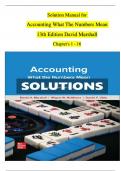Exam (elaborations)
Solution Manual for Accounting What The Numbers Mean, 13th Edition By David Marshall, Complete Chapters 1 - 16 (Verified by Experts)
- Course
- Institution
Solution Manual for Accounting What The Numbers Mean, 13th Edition By David Marshall, Complete Chapters 1 - 16 (Verified by Experts) Solution Manual for Accounting What The Numbers Mean, 13th Edition By David Marshall, Complete Chapters 1 - 16 (Verified by Experts)
[Show more]



